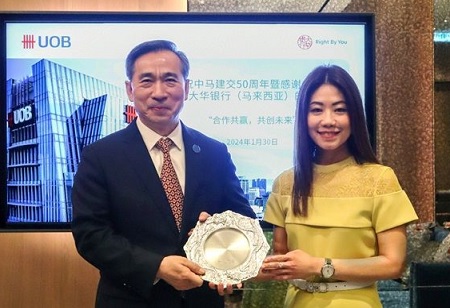
UOB and CCPIT Strengthen MOU to Boost China-Asean Trade

 The UOB Group and China Council for the Promotion of International Trade (CCPIT) have strengthened their memorandum of understanding (MoU) to enhance foreign investment and trade between China and Southeast Asia. This collaboration enables over 350,000 Chinese companies affiliated with the China Chamber of International Commerce (CCOIC) to access UOB's comprehensive range of local and cross-border solutions. UOB's South-East Asian network, including Malaysia, offers these companies an ecosystem of strategic partners. The agreement also aims to facilitate UOB's regional clients in executing projects and conducting business in China, as stated in a UOB press release.
The UOB Group and China Council for the Promotion of International Trade (CCPIT) have strengthened their memorandum of understanding (MoU) to enhance foreign investment and trade between China and Southeast Asia. This collaboration enables over 350,000 Chinese companies affiliated with the China Chamber of International Commerce (CCOIC) to access UOB's comprehensive range of local and cross-border solutions. UOB's South-East Asian network, including Malaysia, offers these companies an ecosystem of strategic partners. The agreement also aims to facilitate UOB's regional clients in executing projects and conducting business in China, as stated in a UOB press release.
The MoU was signed on Jan 31, 2024, and is CCPIT’s only collaboration with a bank in South-East Asia. Established under China’s State Council in 1952, CCPIT plans and implements policies to promote trade and the Memorandum of Understanding (MoU) was formally executed on January 31, 2024, marking CCPIT's exclusive collaboration with a South-East Asian bank. Originating in 1952 under China's State Council, CCPIT strategizes and implements policies aimed at fostering trade and investment relationships between China and foreign nations. The affiliated body, CCOIC, established in 1988, serves to advocate for its members' interests and assist Chinese enterprises in their international endeavors. According to the official statement, UOB and CCPIT intend to support enterprises in key industries, fostering resilient supply chains, promoting innovation, and championing sustainable development.
The initial MOU between UOB and CCPIT was signed in 2012 and subsequently renewed in 2014. This longstanding partnership has proven beneficial for numerous Chinese companies exploring business expansion opportunities in Southeast Asia. Chinese foreign direct investments in Asean surged by 81%, from US$10.3 billion in 2016 to US$18.7 billion in 2022, underscoring the region's appeal to Chinese businesses. Wee Ee Cheong, UOB's Deputy Chairman and Chief Executive Officer, highlighted the ongoing shift of global supply chains into South-East Asia, positioning the region as a promising destination for investment flows.
Wee emphasized UOB's readiness to support Chinese enterprises expanding into Asean, leveraging their extensive regional footprint, robust sector solutions capabilities, and advanced regional payment, trade, and cash platforms. This, he believes, will facilitate the interconnection of local value chains, generate employment opportunities, and contribute to the prosperity of communities in the region. Notably, delegates also participated in the 16th Malaysia-China Business Council meeting in Kuala Lumpur before visiting UOB in Singapore, with UOB Malaysia's support.
UOB Malaysia's Ng Wei Wei highlighted the timeliness of the enhanced collaboration between UOB and CCPIT, coinciding with the celebration of 50 years of diplomatic ties between Malaysia and China in 2024. Recognizing China as one of Malaysia's major foreign investors and trading partners, UOB Malaysia has actively facilitated investments and bilateral trade between the two nations. To date, the bank has supported over 200 Chinese companies expanding into Malaysia. Ng expressed anticipation for UOB Malaysia to leverage its financial expertise, supply chain solutions, and a robust local ecosystem network to attract further investments from China into Malaysia, aligning with the renewed commitment between the two nations to strengthen investment and trade relations.

